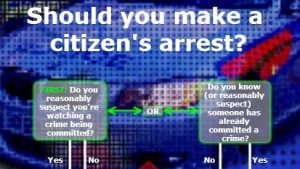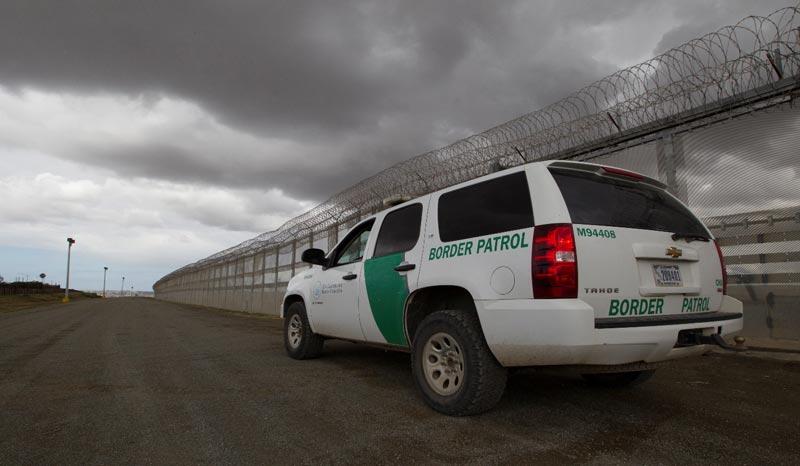(ThyBlackMan.com) It is the dead of night and you are entering your subdivision. You see a Hispanic male (George Zimmerman) shoot and kill a young African American male (Trayvon Martin). What do you do? What can you do? What are you prepared to do? Can you affect an citizen’s arrest? Should you? Or should you simply call the police? What about if you are on a plane and a man or woman starts attacking people and claiming that he/she will crash the plane?
Arrest by a private citizen is the right of any and every United States citizen. And it is how our community can lawfully hold others accountable when they commit crimes. Such an arrest is also one way of reducing crime since police officers cannot be everywhere at the same time. But it’s not that simple and there are many aspects of a citizen’s arrest that you must take into account. Here are some of the things you must be aware of and ask yourself BEFORE you try to make a citizen’s arrest:
1. What is the law on citizen’s arrest my your State? Do I have probable cause (see definition)?
2. Am I prepared to affect a citizen’s arrest, including using force if necessary?
3. What if the person resists the arrest?
4. Will the police department in my city honor a citizen’s arrest?
5. Am I placing myself at risk? What if he/she is armed?
6. If I affect the arrest improperly, am I aware that I could be arrested?
7. What resources or tools do you have available (pepper spray, handcuffs, other citizens etc.)
8. Is the reason for the arrest worth me taking such actions instead of calling the police?
9. Do I have back up support present?
10. Will I go to court and follow through with the process?
11. Can I articulate the law, the charges and my rationale to the police and in court?
In some cases you may need to act in order to save your life and/or the lives of others. And in those cases, your actions will likely be justified. Generally speaking, if you affect a citizen’s arrest when the alleged perpetrator has committed a misdemeanor, you have to be careful because many states only accept citizen’s arrests of a person who has committed a felony and done so in your presence. You must also affect the arrest at that time because you cannot go to his/her home later and make the arrest. Can you get a warrant? Maybe, depending on how strong a judge feels your grounds are. But if you do get a warrant, the Sheriff’s department will likely be the ones to make the arrest. And you might be interested in knowing that police officers are not shielded from arrest as much as you might think.
home later and make the arrest. Can you get a warrant? Maybe, depending on how strong a judge feels your grounds are. But if you do get a warrant, the Sheriff’s department will likely be the ones to make the arrest. And you might be interested in knowing that police officers are not shielded from arrest as much as you might think.
Felonies come on different levels and happen under various circumstances. For example, theft of a certain dollar amount is a felony while theft below that amount is a misdemeanor. Hit and run is often a felony in most cases. Simple assault may be a misdemeanor but aggravated assault is a felony. Therefore you should have some basic knowledge of the laws that apply to the situation and the person you intend to arrest.
Again, you must be aware of the possible consequences in making a citizen’s arrest. This is not to discourage you, but rather to inform and prepare you to weight your options wisely. If you arrest someone and injure them, you could be sued. If you arrest a person without solid grounds for the arrest, you could be charged with false arrest/false imprisonment which is a felony. The police could arrest you and release the other person. I have seen it happen. Or the district attorney’s office could drop the charges on the other person, charge you and have you arrested. A judge could do the same. Therefore, again, affecting a citizen’s arrest could be very risky, especially if you do not know the specific guidelines in your state. All that being said, it is your right as a citizen to make a lawful and justifiable arrest.
A citizen’s ARREST is just that, an arrest – not a detention. Do not be surprised if you have to explain that to some police officers. In my state, for example, only mandated or P.O.S.T. certified or sworn police officers have detention authority, commonly called “investigative detention”. Private citizens do not. Therefore, if a citizen in Georgia restricts or restrains a person from coming and going as he/she pleases, you have arrested them – whether you meant to or not.
Many police officers believe and are told that the citizen can simply DETAIN another individual. They are told this because you cannot be listed on the ticket/citation/report as the arresting officer. Therefore many police officers are failing to acknowledge or understand when a private citizen has made an ARREST. The law calls it an arrest, that is what it is and the police officer does not have the authority to turn it into a detention. This also has a lot of bearing on what must be done with the person who is under arrest and what the police officer’s role is in the process. Research this for yourself in your state.
You must be wise, be smart, be informed and be prepared whenever you exercise any of your rights or authority as a United States citizen. If you are not willing to do your research ahead of time, do not try to make an citizen’s arrest. Instead, gather all the information you can and contact your local law enforcement.
Staff Writer; Marque-Anthony




















Leave a Reply